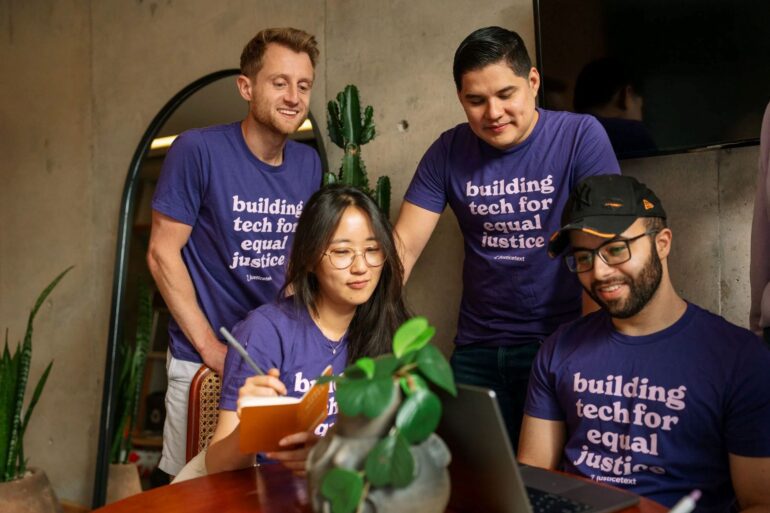TL;DR:
- JusticeText, a startup founded by Devshi Mehrotra and Leslie Jones-Dove, aids public defenders overwhelmed by digital evidence.
- Public defenders face increased workloads due to body camera footage and other recordings, with an average officer’s camera producing 32 files, 7 hours, and 20GB monthly.
- JusticeText offers automatic transcription, time-stamped notes, and video clip creation for evidence, with summarization and AI-powered question capabilities.
- Concerns include data security, privacy, and transcription accuracy, which the platform addresses through confidence thresholds and data protection measures.
- JusticeText’s recent $2.5 million funding round and expansion to over 100 public defender agencies indicate its growing significance in the legal tech landscape.
- Future plans include Spanish-to-English translation and support for multi-language recordings.
Main AI News:
In the ever-evolving landscape of law enforcement and legal defense, Devshi Mehrotra and Leslie Jones-Dove, both alumni of the University of Chicago’s computer science program, embarked on a mission to revolutionize the support system for marginalized communities interacting with the legal system. Their brainchild, JusticeText, is a trailblazing startup that has seized the spotlight at the prestigious TechCrunch Disrupt 2023 event.
Public defenders, essential pillars of the justice system, found themselves inundated with an avalanche of digital evidence. Hours of jail calls, body camera footage, and other forms of recorded materials had become the norm. The statistics are staggering – an average officer’s body camera churns out approximately 32 files, totaling 7 hours and a whopping 20GB of video each month, all at 720p resolution. When multiplied across the vast police force spectrum, the numbers become staggering.
Mehrotra aptly pointed out the dual role that technology plays. While it is crucial for ensuring transparency and accountability in law enforcement, it simultaneously exacerbates the already immense workload borne by public defenders. These dedicated professionals often grapple with caseloads that are three to ten times higher than recommended.
JusticeText, with its innovative approach, aims to be the beacon of hope for public defenders. Their platform is designed to automatically transcribe body camera footage, interrogation videos, and various other forms of evidence. This not only streamlines the workflow but also enables attorneys to create time-stamped notes, craft video clips, and collaborate seamlessly with colleagues.
One of JusticeText’s standout features is its ability to provide concise summaries of uploaded evidence. Furthermore, their ChatGPT-powered tool, MirandaAI, empowers attorneys to pose free-form questions regarding their discoveries, unlocking new dimensions in data analysis.
Mehrotra underscores the significance of this innovation, emphasizing that public defenders owe their clients the best possible defense. By reducing the time spent on discovery review, critical resources can be reallocated to building strong cases and fostering client relationships. From a technical perspective, this translates to fewer IT resources dedicated to troubleshooting technical issues.
Despite these remarkable advantages, concerns linger. The prospect of uploading sensitive evidence to any platform raises red flags, particularly regarding data security and privacy. Attorneys are rightfully cautious about potential data breaches and the usage of uploaded data for AI model training. Accuracy is another valid concern, as transcription technology often falters across various accents and languages, and nuances may elude AI.
Mehrotra addresses these concerns, asserting that JusticeText only generates summaries when confidence thresholds are met. Moreover, they provide tools to redact confidential information from transcripts. Concerning data privacy and storage, JusticeText employs secure cloud servers and robust encryption for data in transit and at rest. Importantly, they refrain from using uploaded data for model training without explicit consent.
These measures have resonated with clients, leading to remarkable growth. JusticeText recently closed a $2.5 million funding round with backing from prominent investors such as Bloomberg Beta, True Ventures, Reid Hoffman (co-founder of LinkedIn), and Michael Tubbs (former mayor of Stockton, California). The startup has expanded its client base to include public defender offices statewide in Massachusetts and Kentucky, boasting relationships with over 100 public defender agencies, nonprofit service providers, and private practice criminal defense firms across the United States, generating an annual recurring revenue of $1 million. This represents significant progress since our last conversation with JusticeText in September 2022, when they had between 50 and 60 partnerships.
Looking ahead, JusticeText’s focus is firmly set on enhancing its capabilities. Their roadmap includes introducing Spanish-to-English translation and support for “multi-language” recordings. The pandemic-induced backlog in the criminal court system underscores the urgent need for change, and JusticeText is poised to meet this demand. They plan to expand their team, emphasizing the growth of their marketing and communications division, ensuring that their transformative technology reaches even more stakeholders in the legal community. Despite the challenges of our times, the platform’s promise shines brightly as a catalyst for much-needed change in the legal landscape.
Conclusion:
JusticeText’s pioneering solution meets a pressing need in the legal market by offering a comprehensive platform for public defenders to manage overwhelming volumes of digital evidence. The recent funding success and rapid client base expansion signify a growing demand for such services. As legal professionals increasingly rely on AI-powered tools for efficiency and accuracy, JusticeText is well-positioned to become a key player in the legal tech industry, providing vital support to the legal community.

